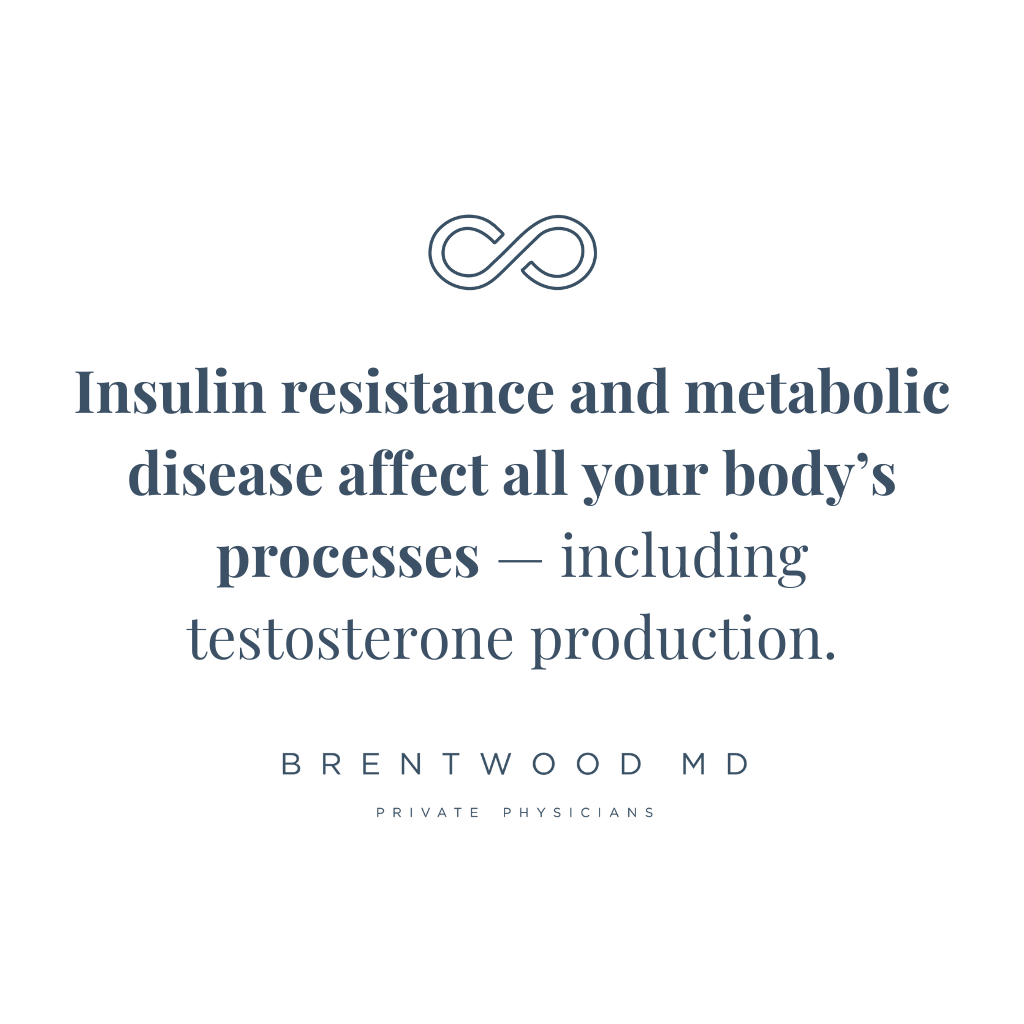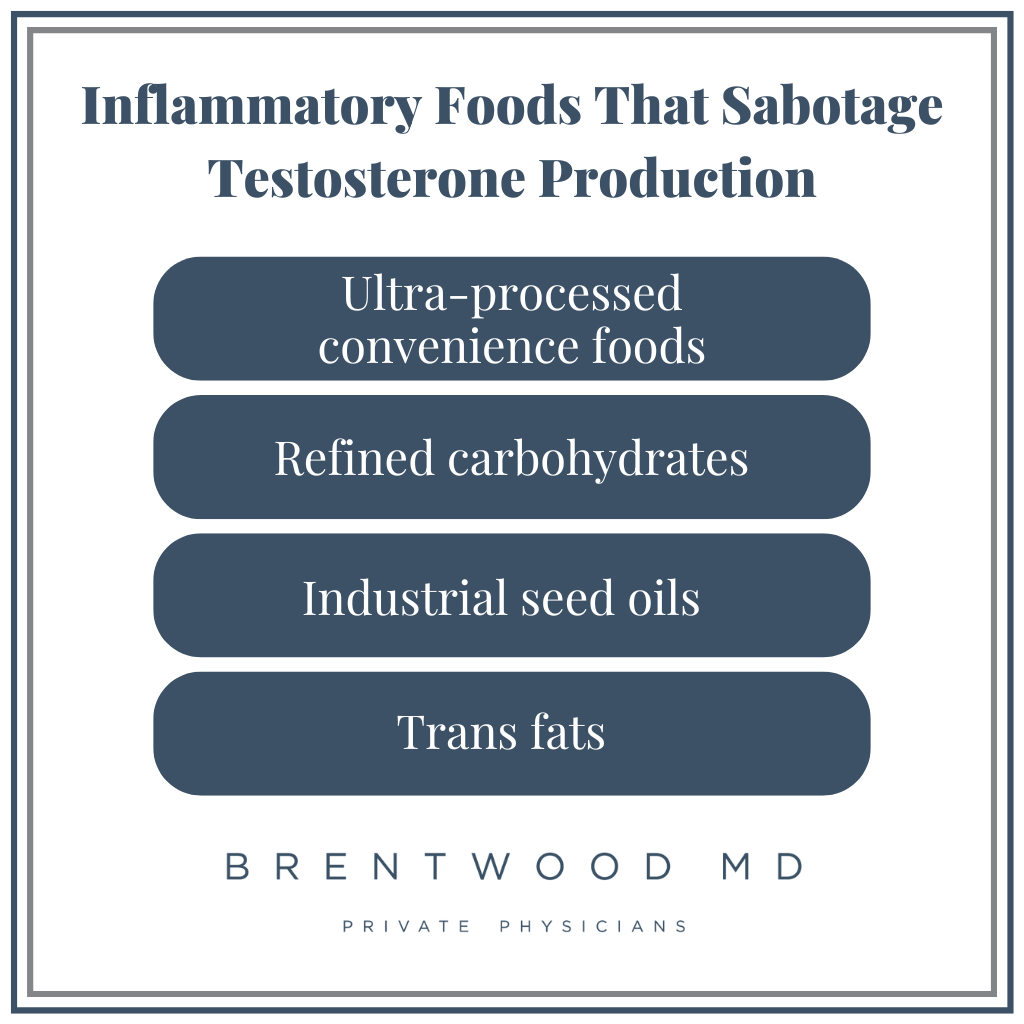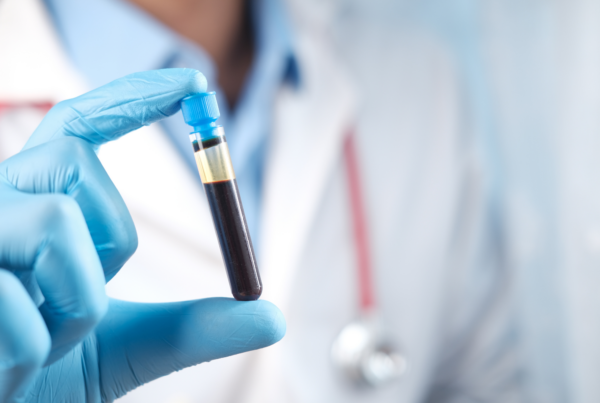You might have noticed from your news feed that the conversation about foods that lower testosterone has gotten a bit ridiculous. Every week, there’s a new clickbait article screaming about “The 5 Foods That Kill Your T-Levels!” or “Avoid These Testosterone Destroyers at All Costs!”
Here’s what bothers me about this approach: It misses the forest for the trees.
Yes, specific foods may negatively impact testosterone production — a little. But instead of obsessing over whether you should avoid soy or licorice root, wouldn’t it be better to focus on the overarching factors that make a much larger impact? But that’s not nearly as clickable.
The truth is, foods that lower testosterone aren’t usually lone villains hiding in your pantry. They’re part of a larger dietary pattern that creates chronic inflammation and insulin resistance — the real enemies of optimal male hormone production.
The Real Story Behind Foods That Lower Testosterone: Inflammation ≠ Hormones
When people ask about foods that lower testosterone, they often want a simple list of specific items to avoid. I get it. Lists are easy. But testosterone decline isn’t quite that straightforward.
Here’s what I’ve learned after years of helping men optimize their testosterone: Anything that raises total body inflammation tends to lower testosterone.
Think about it this way. Your body is constantly making decisions about where to allocate its resources. When you’re dealing with chronic inflammation — whether from poor food choices, lack of sleep, or overtraining — your body shifts into survival mode. Hormone production, including testosterone, takes a back seat to putting out the inflammatory fires.
This goes for other hormones, too. You can get low thyroid from overtraining or from not enough sleep. And, yes, you can get low testosterone from eating processed, inflammatory foods.
The Modern Male’s Hormonal Challenge
We’re living through an unprecedented decline in male testosterone levels. Since the 1980s, average testosterone levels in American men have dropped by about 1% per year. That means a 40-year-old man today has roughly 30% less testosterone than a 40-year-old man in 1987.
What changed? Well, quite a bit. But the shift in our food environment is one of the largest, most obvious factors.
The explosion of processed foods, refined carbohydrates, and industrial seed oils has created a perfect storm for hormonal disruption. These aren’t just foods that lower testosterone — they’re foods that drive the hidden metabolic dysfunction that underlies our modern health crisis.
Remember, the holy grail of health is normalized blood sugar levels. This is true for all health, not just what’s happening at your waistline.
When the foods you eat keep your blood sugar chronically elevated, insulin constantly pumps into your system in response. Over time, your body grows resistant, increasingly ignoring that insulin until you develop serious metabolic disease.
But diabetes isn’t the only worry here. Insulin resistance and metabolic disease affect all your body’s processes — including testosterone production.
How Modern Foods Are Sabotaging Your Testosterone
The Inflammatory Food Connection
Instead of giving you “6 Foods That Lower Testosterone!” to avoid, I want to teach you the underlying mechanism so you can make informed decisions regardless of what’s in front of you.
High-inflammatory diets, which tend to be rooted in highly processed foods, create an environment where testosterone production suffers.
We can break these inflammation-causing foods down into a few categories:
- Ultra-processed convenience foods: Frozen dinners, packaged snacks, and anything with a long list of unpronounceable ingredients
- Refined carbohydrates: White breads, pastries, sugary cereals that spike your blood sugar and insulin levels
- Industrial seed oils and high fructose corn syrup: Found in most processed foods and promote inflammation throughout your body
The Blood Sugar-Testosterone Connection
Your body’s ability to produce testosterone is intimately connected to your metabolic health.
When you eat foods that constantly spike your blood sugar — think sodas, pastries, processed snacks — your body has to pump out insulin to manage the glucose flood. Chronically elevated insulin doesn’t just make you store fat; it also disrupts the delicate hormonal cascade responsible for testosterone production.
On top of that, constant insulin spikes and increased insulin resistance tell your body to store fat rather than burn off that excess energy, especially in the absence of exercise.
This is why intermittent fasting has been such a game-changer for so many. By giving their bodies extended breaks from food — and therefore from insulin spikes — they restore the optimal hormonal environment for testosterone production.
The 120-Year Food Rule
My simple approach to avoiding foods that undermine your testosterone is this: If it wasn’t food 120 years ago, it isn’t food today.
In the modern era, we’re omnivores in an omnivore’s paradise — or so it seems. We’re surrounded by tantalizing aromas and tasty treats, all accessible at the drop of a hat. We can eat everything in sight with almost no resistance between the wanting and the getting.
It’s a dilemma, especially when these foods are actually engineered — from their color to their sugar content to the sound their packaging makes — to draw you in.
But our bodies are designed to thrive on real, whole foods. And the ultra-processed products that now make up the majority of the American diet are gumming up the works.
So keep this one rule in mind whenever you’re at the grocery store. If it wasn’t food back then, it isn’t food now.
You can apply it to everything.
Grass-fed beef? That’s been food for millennia. Wild-caught salmon? Definitely food. A protein bar with 30 ingredients? Probably not. Neon-colored cereal? George Washington wouldn’t touch it.
What Actually Builds Testosterone
Let’s take it a step further and talk about foods that actively support healthy testosterone production.
Healthy Fats Are Your Friend
Despite decades of fat-phobic messaging, the truth is that healthy fats are essential for hormone production. Testosterone is made from cholesterol, so severely restricting dietary fats can actually harm those levels.
Focus on:
- Healthy saturated fats: Grass-fed butter, coconut oil, fatty cuts of meat
- Monounsaturated fats: Avocados, olive oil, nuts
- Omega-3 fatty acids: Wild-caught fish
Protein: The Building Block of Vitality
Adequate protein intake is crucial for testosterone production and overall male vitality. Aim for 80–120 grams daily, focusing on high-quality sources like grass-fed meat, wild fish, and pasture-raised eggs (which offer great overlap with healthy fats!).
Strategic Carbohydrate Timing
I’m not anti-carb, but I am pro-strategic carbs. Instead of starting your morning with a blood sugar spike from cereal, pastries, or pancakes, for example, consider switching to a healthy protein- and fat-rich meal. Also, pushing your first meal a bit later in the day gives your body a longer window of freedom from insulin in which to optimize its hormone production cycles.
Beyond Diet: The Testosterone Optimization Lifestyle
While cleaning up your diet is crucial, testosterone optimization requires a holistic approach.
Sleep: The Underrated Hormone Optimizer
Most testosterone gets produced during sleep, particularly during deep sleep phases. If you’re consistently getting less than seven hours of quality sleep, no amount of dietary tweaking will fully optimize your testosterone levels.
Consider what small but consistent changes you can make to your bedtime routine, diet, or stress management that would help you give your body the sleep it needs. If needed, talk to your doctor about getting a sleep study to check for sleep apnea.
Strength Training: Nature’s Testosterone Booster
Resistance training is one of the most effective ways to naturally boost testosterone production. The mechanical stress placed on your muscles during strength training signals your body to increase testosterone production. Increasing lean muscle mass is also an excellent way to fight back against insulin resistance.
Stress Management: The Often-Ignored Factor
Chronic stress elevates cortisol, which directly suppresses testosterone production. Whether through meditation, spiritual pursuits, time in nature, or simply saying no to unnecessary commitments, managing stress is non-negotiable for testosterone optimization.
The Concierge Medicine Advantage
Unfortunately, traditional healthcare tends to fall short in the area of hormone optimization. In a typical 15-minute appointment, there’s barely enough time to review your symptoms, let alone look into potential root causes, targeted lifestyle changes, or comprehensive strategies.
In concierge medicine, we have the time to dig deeper — by design. We explore your specific circumstances, create personalized lifestyle modifications that fit your situation, and monitor your progress with the attention it deserves.
Testosterone optimization isn’t one-size-fits-all. It requires understanding your unique biology, lifestyle constraints, and health goals. A personalized approach is what helps you to feel better and reclaim the vitality of your peak years.
Foods That Lower Testosterone: The Bottom Line
The foods that lower testosterone aren’t mysterious. They’re the inflammatory, processed products that have become the foundation of the modern American diet.
Instead of memorizing lists of forbidden foods, you can focus on this simple principle: Eat real, whole foods that were around 120 years ago, and minimize processed junk that spikes your blood sugar while creating inflammation.
Your testosterone levels — and your overall vitality — will thank you.
If you’re experiencing symptoms of low testosterone, like fatigue, decreased muscle mass, low libido, or mental fog, you don’t have to accept it as “normal aging.” These symptoms often reflect correctable imbalances that can be addressed with the right strategy.
Your best years don’t have to be behind you. With the right approach to nutrition, lifestyle, and — for some — strategic medical support, you can reclaim the energy and vitality that make life worth living.

Dr. Aaron Wenzel is a concierge physician specializing in the care of fast-moving entrepreneurs, executives, and public figures in the Nashville, TN area. Dr. Wenzel’s diverse life experience and extensive training in family medicine, emergency care, nutrition, and hormone replacement therapies give him the unique platform to provide unmatched care for his patients.









